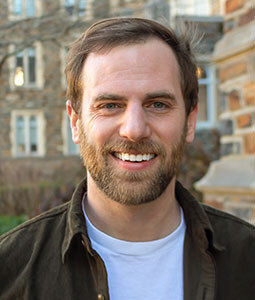Department of Sociology
Faculty and Staff Directory
Joseph Quinn
| Title: | Assistant Professor |
| Department: | Department of Sociology McCausland College of Arts and Sciences |
| Email: | joe.quinn@sc.edu |
| Phone: | 803-777-3123 |
| Resources: | Curriculum Vitae [pdf] Website |

Bio
Joseph Quinn is an Assistant Professor of Sociology at the University of South Carolina and a Research Fellow at the Center for Health Policy at the Duke Global Health Institute. His research explores how networks and social environments can reproduce or reshape culture. Joe’s studies often position social psychological, cognitive, and relational processes as mechanisms, and mental representations, prosocial behavior, and stratification as outcomes. Joe earned his PhD from Duke University in 2022, with concentrations in network analysis and social psychology. He collaborates with students through his working group, the Dynamic Environments and Meaning Change Lab.
Research
Substantive research interests: social psychology; cognition; networks; cultural evolution; organizations; group processes; stratification.
Department cluster: Social Psychology; Inequalities and Institutions; Networks.
Research Overview: Joe studies how people’s environments and connections to members of groups combine with their cognitive faculties to (a) shape their individually held beliefs about and behaviors toward dissimilar people, and (b) influence macro-level patterns of stratification and segregation. A portion of his current research explores methods for measuring and modeling networks, and approaches to measuring differences in social rank of different occupational identities.
Current Projects: Joe’s ongoing projects leverage novel survey data, experiments, agent-based simulations, and secondary datasets to explore the following questions:
- Did the Covid-19 pandemic make people change their beliefs about certain jobs?
- How does shared category membership shape people’s tendency to compete versus cooperate with each other over valuable resources?
- How can organizational norms and the structural decisions of leadership shape the views of their members?
- Do work from home opportunities lessen or worsen the cognitive “motherhood penalty” for mothers who work?
- How can the narratives we consume shape the mental representations that people from different political parties have about certain social identities?
Teaching
SOCY 101 – Introduction to Sociology
SOCY 392 – Elementary Statistics for Sociologists
SCHC 497 – Gender and Occupational Stratification
SOCY 500 – Social Networks
SOCY 561 – Real-World Research Experience
SOCY 598 – Culture and Cognition
Selected Publications
Quinn, Joseph M, Robert E Freeland, Em K Maloney, Kimberly B Rogers, and Lynn Smith-Lovin. 2024. “Meaning Change in U.S. Occupational Identities During the Covid-19 Pandemic: Was it a Deflection or a Cultural Change?” Social Psychology Quarterly. DOI: 10.1177/01902725241228529
Quinn, Joseph M and Ashley Harrell. 2024. “Repeated Exchange Network Structures Affect Future Trust Toward Unmet In-Group and Out-Group Actors.” Advances in Group Processes. DOI: 10.1108/S0882-614520240000041004
Harrell, Ashley and Joseph M Quinn (equal authorship). 2023. “Shared Identities and the Structure of Exchange Distinctly Shape Cooperation.” Social Forces. DOI: 10.1093/sf/soad011
Quinn, Joseph M, Lynn Smith-Lovin, Robert E Freeland, Kimberly Rogers, and Jesse Hoey. 2023. “How Cultural Meanings of Occupations in the U.S. Changed with the Covid-19 Pandemic.” American Behavioral Scientist. DOI: 10.1177/00027642211066041
Jacobs, Susan and Joseph M Quinn. 2022. “Cultural Reproduction of Mental Illness Stigma and Stereotypes.” Social Science and Medicine. DOI: 10.1016/j.socscimed.2021.114552
Quinn, Joseph M and James W Moody. 2020. “Computational Modeling” in SAGE Research Methods Foundations. London, UK: Sage Publications Ltd. DOI: 10.4135/9781526421036945708